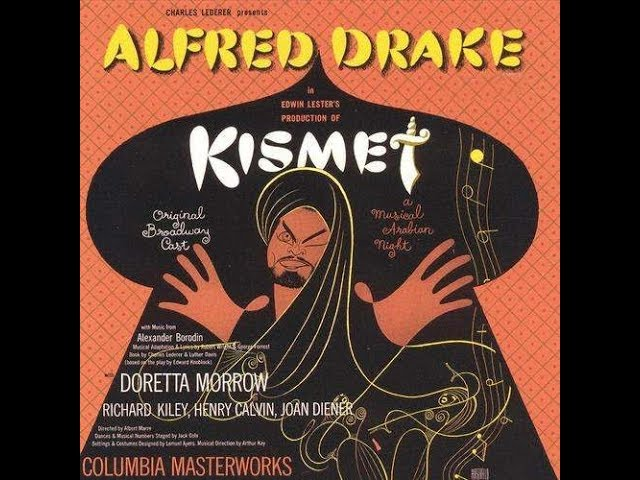When I was small, I listened to the radio and the LP records my parents played on the radiogram. Some of their records were by smooth solo singers like Sinatra and Nat King Cole, which bored me. They were also into musicals and often went to see the newest movie or the occasional West End show. Some shows they had records of are now quite obscure, Irma la Douce and Kismet for example.
Kismet had the most dramatic and. to my very young mind the scariest cover. The tunes were beautiful, remarkable and I always notice when I hear a snatch of them, not surprising when you know they were by Borodin. I didn't when I was seven.But it wasn't a show tune or a great classical track that made the most impression on me. When we lived in England we had a big radiogram but sometimes we weren't in the UK. Father was a British Army doctor so we moved home a lot, the most far-flung place we lived was Aden. There we had a smaller portable record player. Some records came with us and we accumulated more, from the NAAFI, from Bhicajee Cowasgee which was the biggest department store in town and from passing ships, which included American warships. Aden was a very important international harbour in those days.
One day in Aden my dad came home with ‘Big Bill’s Blues’, an album of Big Bill Broonzy’s songs. I wasn't aware of the blues before, but Big Bill's rhythmic guitar playing and his straight forward lyrics, along with the great tunes appealed to me. One song stood out and I was just about old enough to understand. It was the beginning of my awareness of what was happening in the world outside my own nine-year-old bubble, and not just in my surroundings in Aden, but also across the world.
‘Black, Brown and White’ is Big Bill Broonzy singing, in a very deliberately calm, laid back way, about his experience of racism;
"They says if you was white, should be all right,
If you was brown, stick around,
But as you're black, m-mm brother, get back get back get back."
*
I've never forgotten those lyrics or the impact they had on me. Big Bill Broonzy's Black, Brown and White' (or Get Back, as it's also known) is my first inheritance track, it changed my view of life. I became aware that things weren't fair, even out there in the world of the grown-ups.
Black, Brown and White has to be my first Inheritance Track and I'm in no doubt that my second has to be another song with a powerful message. I've always thought the words are more important than the tune, it's why I'm a writer. Much as I can enjoy music, I've never been musical.
I've been thinking a lot about my favourite singers, bands and songs. The Beatles also have a song called Get Back, but that's a story rather than a specific message. The Rolling Stones' Satisfaction is a message of defiance, so is Peter Green and Fleetwood Mac's Oh Well. Leonard Cohen has wonderful, meaningful lyrics which feel too intimate, too personal to pass on as my choice. Bob Dylan has plenty of messages, but somehow songs like Masters of War and Blowin' in the Wind are too pessimistic for me to want to pass them on.Then I realised I was going back to where I was, when I began choosing my own music. Not the Beatles but to John Lennon and his song, Imagine. Yes this song has been derided, even despised for its idealistic, hippie message, but the lyric is more concise and powerful than the Beatles biggest message, All You Need is Love, which was always, to me, a bit simplistic,
It isn't hard to do
Nothing to kill or die for
And no religion, too."
*
Those lines resonate more as the 21st century progresses and the human race doesn't.
Imagine says things that I believe.
So yes, I'm an old hippie, is that a bad thing?
*
Kismet Album Cover art by Al Hirschfeld
Broonzy photo from Frank Driggs Collection/© Archive Photos. Photographer unnamed.
John Lennon/Plastic Ono Band Imagine cover by Apple



